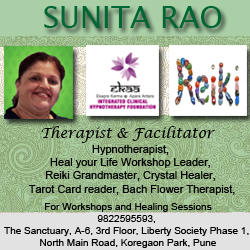Alternative Therapies
- Alternative Medicine
- Access Bars
- Access Body Processes
- Access Consciousness
- Access Energetic Faclift
- Acupressure
- Acupuncture
- Angel Healing
- Ayurveda
- Bach Flower Remedies
- Breathwork
- Cosmetic Acupuncture
- Crystal Healing
- Cupping Therapy
- Emotional Freedom Technique (EFT)
- Ergonomics
- Fengshui
- Geopathic Stress
- Face Reading
- Graphology
- Heal Your Life
- Holistic Solutions
- Holy Fire Reiki
- Homeopathy
- Ho'oponopono
- Hoodoo
- Hypnotherapy
- Inner Child Therapy
- Jesus Reiki
- Jikiden Reiki
- Manual Therapy
- Meditation
- Melchizedek Method
- Motivational Counseling
- Mudra Healing
- Nadi Vaidya
- Naturopathy
- Neuro Linguistic Programming (NLP)
- Panchakarma (Ayurveda)
- Past Life Regression
- Physiotherapy
- Pranic Healing
- Pyramids
- Quantum Touch Healing
- Reiki
- Rudraksh
- Shamanic Healing
- Sound Healing
- Silva Mind Control Method
- Sujok therapy
- Tarot
- Theta Healing
- Unani Medicine
- Yoga
- Wicca
- Womb Healing
Diseases & Conditions
- Acne & Pimples
- Allergies
- Arthritis
- Asthma
- Behavioural Disorders
- Dandruff
- Diabetes
- Emotional Problems
- Gallstones
- Gastritis
- Hairloss
- Heart Diseases
- Hormonal Problems
- Hypertension
- Immune Disorders
- Infections
- Infertility
- Jaundice
- Kidney Disorders
- Liver Disorders
- Menstrual Disorders
- Migraine
- Neck & Back Pain
- Obesity
- Osteoporosis
- Peptic Ulcer
- Prevention
- Prostate Problems
- Psoriasis
- Sexual Dysfunctions
- Sinusitis
- Sleep Disorders
- Skin Diseases
- Stress
- Thyroid Disorders
- Ulcerative Colitis
- Urinary Infections
General Wellness
Parent Counseling in Baramati
Sarayu Healing Center - Ms. Sunita Rao

In her pursuit of finding better ways to heal the human body, mind and spirit Sunita Rao has been certified by internationally renowned organizations such as the EKAA School of Integrated Clinical Hypnotherapy and Heal Your Life based on the philosophy of Louise L Hays. She is also a Reiki Grandmaster Practicing and initiating in the Usui system of Reiki..

Dr. Geetanjali Saxena.

Past life Regression Trainer, Family Constellation Trainer, Theta Healing Trainer, Inner Child Work, Angel Therapist, Reiki healer, Hypnotherapy, Crystal Healing, Graphology, Tarot card reader & Astrologer


Ms. Anjali Nagpal
Anjali Nagpal is a business trainer, a life coach and workshop facilitator certified to present Heal Your Life transformational workshop worldwide (based on the philosophy of Louise L Hay) approved by Hay House, US. She also conducts others workshops relating to self healing.

Abhay Thakkar

Abhay Thakkar, is India's only NLP Trainer to provide both - NLP as well as New Code NLP Trainings certified by co-creator of NLP - John Grinder as well as co-developers of New Code NLP - Carmen Bostic St Clair and Michael Carroll...

Dr. Kirti Kanodia

Kirti Kanodia is a certified Theta Healer, Trained Family Constellation Facilitator, Tarot card Reader, Past life Regression Therapist, Angel card reader, Inner child integration, Astrologer, Tasso Therapist and Reiki Master.

Inner Journeys

A Certified Past Life Regression Therapist, Healer, psychic and channel, who has been working in the field of channelled spiritual direction since ...

Parenting

10 principles of good parenting
1. What you do matters
Whether it's your own health behaviors or the way you treat other people, your children are learning from what you do. Don't just react on the spur of the moment. Ask yourself, What do I want to accomplish, and is this likely to produce that result?"
2. You cannot be too loving
"It is simply not possible to spoil a child with love.What we often think of as the product of spoiling a child is never the result of showing a child too much love. It is usually the consequence of giving a child things in place of love -- things like leniency, lowered expectations, or material possessions."
3. Be involved in your child's life
"Being an involved parent takes time and is hard work, and it often means rethinking and rearranging your priorities. It frequently means sacrificing what you want to do for what your child needs to do. Be there mentally as well as physically."
4. Adapt your parenting to fit your child
Keep pace with your child's development. Your child is growing up. Consider how age is affecting the child's behavior.
5. Establish and set rules
If you don't manage your child's behavior when he is young, he will have a hard time learning how to manage himself when he is older and you aren't around. Any time of the day or night, you should always be able to answer these three questions: Where is my child? Who is with my child? What is my child doing? The rules your child has learned from you are going to shape the rules he applies to himself.
6. Foster your child's independence
"Setting limits helps your child develop a sense of self-control. Encouraging independence helps her develop a sense of self-direction. To be successful in life, she's going to need both."
7. Be consistent
"If your rules vary from day to day in an unpredictable fashion or if you enforce them only intermittently, your child's misbehavior is your fault, not his. Your most important disciplinary tool is consistency. Identify your non-negotiables. The more your authority is based on wisdom and not on power, the less your child will challenge it."
8. Avoid harsh discipline
Parents should never hit a child, under any circumstances. Children who are spanked, hit, or slapped are more prone to fighting with other children," he writes. "They are more likely to be bullies and more likely to use aggression to solve disputes with others."
9. Explain your rules and decisions
"Good parents have expectations they want their child to live up to,. "Generally, parents overexplain to young children and underexplain to adolescents. What is obvious to you may not be evident to a 12-year-old. He doesn't have the priorities, judgment, or experience that you have."
10. Treat your child with respect
"The best way to get respectful treatment from your child is to treat him respectfullys. You should give your child the same courtesies you would give to anyone else. Speak to him politely. Respect his opinion. Pay attention when he is speaking to you. Treat him kindly. Try to please him when you can. Children treat others the way their parents treat them. Your relationship with your child is the foundation for her relationships with others."








